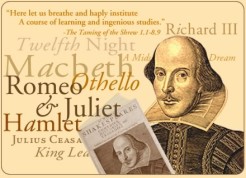An admittedly heated response about the notion that a librarian can't read Shakespeare
/One of the students who I'm working with this summer told me that he doesn't like Shakespeare. I told him that he doesn't like Shakespeare because he doesn't know Shakespeare, and he hasn't had a teacher who loved Shakespeare enough to pass the love onto him.
Shelf Awareness featured a librarian who answered the question, “Book you've faked reading?” with this:
I have never faked reading anything but I am embarrassed to say that I have never read Shakespeare, though I have tried.
I adore librarians, so the last thing I want to do is criticize one, but I have been turning her response over in my head for the past day and find myself unable to refrain from commenting.
Her response annoys me.
It annoys me because if you are a librarian in an English speaking country, shouldn’t you have read at least one title from Earth’s most well known and well respected English writer? Isn’t this the minimum that one should expect from a caretaker of the written word?
 It annoys me because there are thousands of resources available to assist in the reading of Shakespeare, and many of them are probably sitting on the shelves of her library. There are Spark Notes and side-by-side language comparisons and novelizations that would assist immensely in comprehension, so don’t tell me that you tried. Any literate adult can make sense of Shakespeare with the use of these resources.
It annoys me because there are thousands of resources available to assist in the reading of Shakespeare, and many of them are probably sitting on the shelves of her library. There are Spark Notes and side-by-side language comparisons and novelizations that would assist immensely in comprehension, so don’t tell me that you tried. Any literate adult can make sense of Shakespeare with the use of these resources.
It annoys me because I have been reading Shakespeare with my third and fifth graders for fifteen years now, and I have yet to meet a student who cannot make some sense of his plays. Granted we read abbreviated versions of them, often after having read a novelization of the same play, but we read the text in the original Old English. If 8 year-old and 10 year-old children can do it, I suspect that this librarian can as well.
It annoys me because this librarian expressed embarrassment for never having read Shakespeare, and yet she has not yet rectified the situation. This is not the kind of embarrassment over having never visited a famous landmark even though it is located in your hometown. This is professional embarrassment, akin to a teacher expressing embarrassment over never having mastered a mathematical concept that he must teach. This is not trivial stuff. Kids undoubtedly enter that library every year with assignments dealing with Shakespeare. Pointing to the books is nice, but wouldn’t it be nice to have some familiarity, if not expertise, with them as well?
But it annoys me most because responses like this help to perpetuate the myth that Shakespeare is impenetrable and boring, when this could not be further from the truth. Shakespeare’s plays are stories of love and tragedy, treason and treachery, life and death. Even my most skeptical students end up loving these plays. Shakespeare has helped me turn children who do not like to read into lifelong readers. They are stories that engage both boys and girls and have resulted in some of the most fascinating, in-depth and heated conversations that have ever taken place in my classroom. I have watched learning disabled students, deaf students, students who barely speak English, and emotionally troubled students take the stage and recite Shakespearean lines from memory with all the emotion and understanding of a professional actor.
Don’t tell me that you tried to read Shakespeare.
And don’t for a second tell the world that you tried. I have about 250 former students who would scoff at the notion that an adult, and a librarian at that, tried to read Shakespeare but failed.
There is a reason that Shakespeare has lasted hundreds of years, and it is not because educated, English speaking adults were unable to read and fall in love with the work.
Try again, damn it.